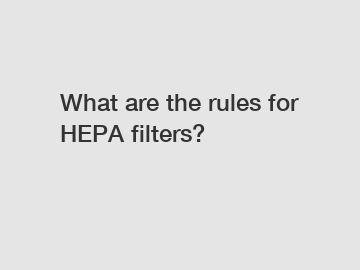What are the rules for HEPA filters?
In our quest for clean and healthy indoor environments, HEPA filters have become an indispensable tool. These high-efficiency particulate air filters are designed to capture tiny pollutants that can adversely affect our well-being. Whether you're concerned about allergies, asthma, or simply want fresh air, understanding the rules for HEPA filters is crucial to ensuring their effectiveness. Join us as we demystify the world of HEPA filters and explore the guidelines that govern their usage.
1. Unveiling the HEPA Standard:
HEPA filters owe their unrivaled reputation to a set of stringent regulations that dictate their performance standards. The acronym HEPA stands for "high-efficiency particulate air," indicating the filter's ability to trap tiny particles. According to the "True HEPA" standard set by the United States Department of Energy (DOE), these filters must capture 99.97% of airborne particles as small as 0.3 microns. This level of precision differentiates HEPA filters from other types available on the market.

2. The HEPA Filter Construction:
Crafted with precision, HEPA filters are manufactured using a complex arrangement of fibers. Multiple layers of fine fibers are intricately woven together, creating a dense mesh-like structure. This design allows the filters to effectively capture and retain microscopic particles, including pollen, dust mites, pet dander, mold spores, and even bacteria and viruses.
3. Residential and Commercial HEPA Filters:
HEPA filters are available in two categories—residential and commercial. Residential HEPA filters are typically used in air purifiers, vacuum cleaners, and HVAC systems. For commercial applications, specialized HEPA filters are employed in cleanrooms, hospitals, laboratories, and industries where air quality is critical. Both variants follow the same HEPA standard but differ in terms of size, design, and capacity.
4. HEPA Filter Maintenance:
To ensure optimum performance, regular maintenance is key. Although HEPA filters are highly efficient, they do have a limited lifespan. Over time, the accumulation of particles on the filter reduces its effectiveness. It is crucial to follow the manufacturer's guidelines regarding filter replacement and cleaning intervals. Generally, residential HEPA filters require replacement every 12 to 18 months, while commercial filters may need more frequent changes, depending on the usage and contaminant levels.
5. HEPA Filters and Allergies:
One of the primary reasons people turn to HEPA filters is their ability to alleviate allergy symptoms. HEPA filters effectively capture airborne allergens like pollen, pet dander, and dust mites. Though they cannot eliminate all allergens, they significantly reduce their concentration, leading to improved air quality and reduced allergies. Additionally, combining HEPA filters with proper ventilation and regular cleaning can provide immense relief to allergy sufferers.
6. HEPA Filters and Asthma:
Asthma patients are particularly susceptible to airborne triggers, and HEPA filters can be a valuable ally in managing the condition. By trapping irritants within their mesh-like fibers, HEPA filters help minimize asthma attacks and improve overall lung function. Ensuring the proper circulation of clean air in bedrooms and living spaces is particularly important for asthma patients.
7. HEPA Filters: Choosing the Right Product:
When selecting a HEPA filter, it is crucial to consider the room size, filtration needs, and the manufacturer's reputation. Opt for filters that bear the "True HEPA" certification, ensuring that they meet the 99.97% capture efficiency standard. Additionally, explore additional features such as activated carbon filters, pre-filters, and UV-C lights, as they enhance the overall air purification process.
Conclusion:
In the pursuit of healthier living, HEPA filters have emerged as a trusted tool. Their highly efficient nature and adherence to strict standards enable them to remove a wide range of airborne pollutants from our indoor environments. By understanding the rules that govern HEPA filters, including their construction, maintenance requirements, and impact on allergies and asthma, we can harness their full potential in improving air quality and safeguarding our well-being.
Remember, investing in a quality HEPA filter is an investment in your health – breathe clean, breathe easy!
If you are looking for more details, kindly visit air filter photocatalyst, water treatment plants photocatalyst filter, photocatalyst air filter.

Comments